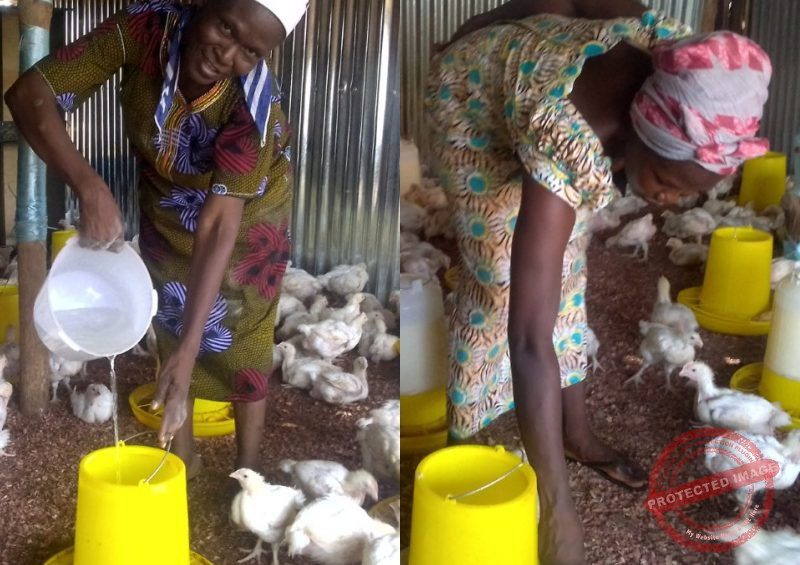You are here: Home | Economy | Featured | National News | News | Women trainees in Juba hope to start own poultry farms

51-year-old widow Jenty Peter Natie and 35-year-old Viles Mamur at a community poultry farm in Gudele, Juba | Credit | Charles Wote/Eye Radio
A group of women passionate about poultry farming are acquiring the much-needed skills to venture into the business on their own.
The women, 20 in number, have been working as volunteers at the community poultry farm in Gudele area – 5 kilometres west of the capital Juba.
“I come at 7:00 am to feed them [chicken] because this poultry work needs someone to pay much attention to protect the chicks, and to reduce the risk of disease outbreak amongst them,” said 51-year-old widow Jenty Peter Natie.
The mother of 8 children told Eye Radio that she takes care of about 750 chicks at the farm.
The farm is supported by Support Peace Initiative for Development Organization, SPIDO with funding from the Turkish Cooperation and Coordination Agency – also known as TIKA.
The 20- square meter farm found just a few yards to her house in Gudele Block 3, is roofed with iron sheets and its wall covered with bamboos.
The NGO-supported farm is partitioned into two sections with each block containing three hundred and seventy-five chicks.
When Eye Radio’s Charles Wote visited the women at the poultry farm this week, Jenty and her volunteer colleagues said they would like to start their own chicken farming business but quickly added that their main challenge is raising the capital needed to start individual poultry farms.
Apart from buying the broilers and layers, Jenty said the cost of feeding the chickens is also something to bear in mind.
“I feed them at 7:00 am, 12:00 pm and also at around 3:00 pm.”
The volunteers often feed the chicks with water and grains – a mixture of maize and rice provided by SPIDO. The chicks are expected to complete their incubation period in three months.
But Jenty and her colleagues still see the potential in the business.
“If these chicks grow, I can pay school fees for my children[and] if I’m sick or my child is sick, or during any other emergencies, we can sell and use that money to help each of us,” an optimistic Jenty narrated.
“That is why it is important to learn how to rear chickens.”
But volunteering at the community poultry farming is not meeting Jenty’s immediate needs. The chicks are yet to hatch or grow to their full capacity. So in order to support her 8 children, she currently sells charcoal in order to put food on the table.
“You cannot get something good without suffering first,” said 35-year-old Viles Mamur who also volunteers at the same poultry farms. She is a mother of four.
Viles dropped out of secondary school in Khartoum, Sudan in 2004. She said she doesn’t take the skills she gains from the farm for granted.
“It is an opportunity for us to work hard to alleviate our suffering especially those of us who are living in poverty.”
Both Natie and Mamur were earlier trained in poultry keeping before embarking on the job.
Just like Jenty, Viles hopes to establish her farm soon.
“I sell charcoal, G-nut and other items and I come here to gain knowledge and in case if I get another support, I will be able to start mine.”
South Sudan largely imports chicken mainly from Brazil and neighboring Uganda.
According to the UN Food and Agriculture Organization, South Sudan’s chicken stocks were stable at around 15,000 between 2000 and 2018.
The report placed China on the top ten world producers with over 4 million chickens, followed by the United States with over 1 million per annum.
Other countries on the top list include Indonesia, Brazil, Iran, Mexico, Pakistan, Russian Federation, and Japan.
While the African continent had just 1.6 million chicken stock within the same period.
Glamourson Eales Musembe, the Program Manager for SPIDO believes South Sudan can produce more poultry if such programs are adopted by the communities.
“If a number of them are going to get these skills and others will have to maybe replicate the same initiative where they came from. Then you will see that replication will help a bigger portion of the community to earn out of it,” he stressed.
Mr. Musembe said poultry farming can create employment opportunities for South Sudanese at multiple levels, ranging from production to distribution.
He encourages people to embark on this economic activity, saying it offers quick investment returns because it does not require much capital to start a poultry farm.
Support Eye Radio, the first independent radio broadcaster of news, information & entertainment in South Sudan.
Make a monthly or a one off contribution.
Copyright 2024. All rights reserved. Eye Radio is a product of Eye Media Limited.